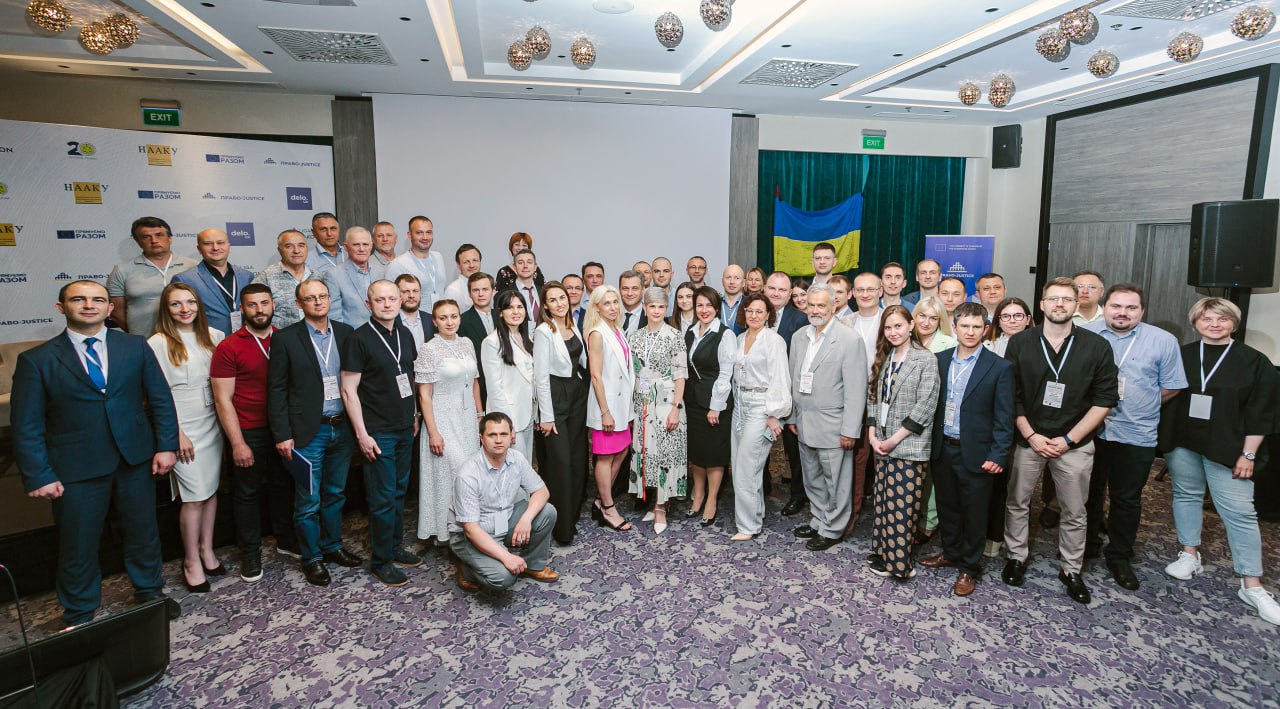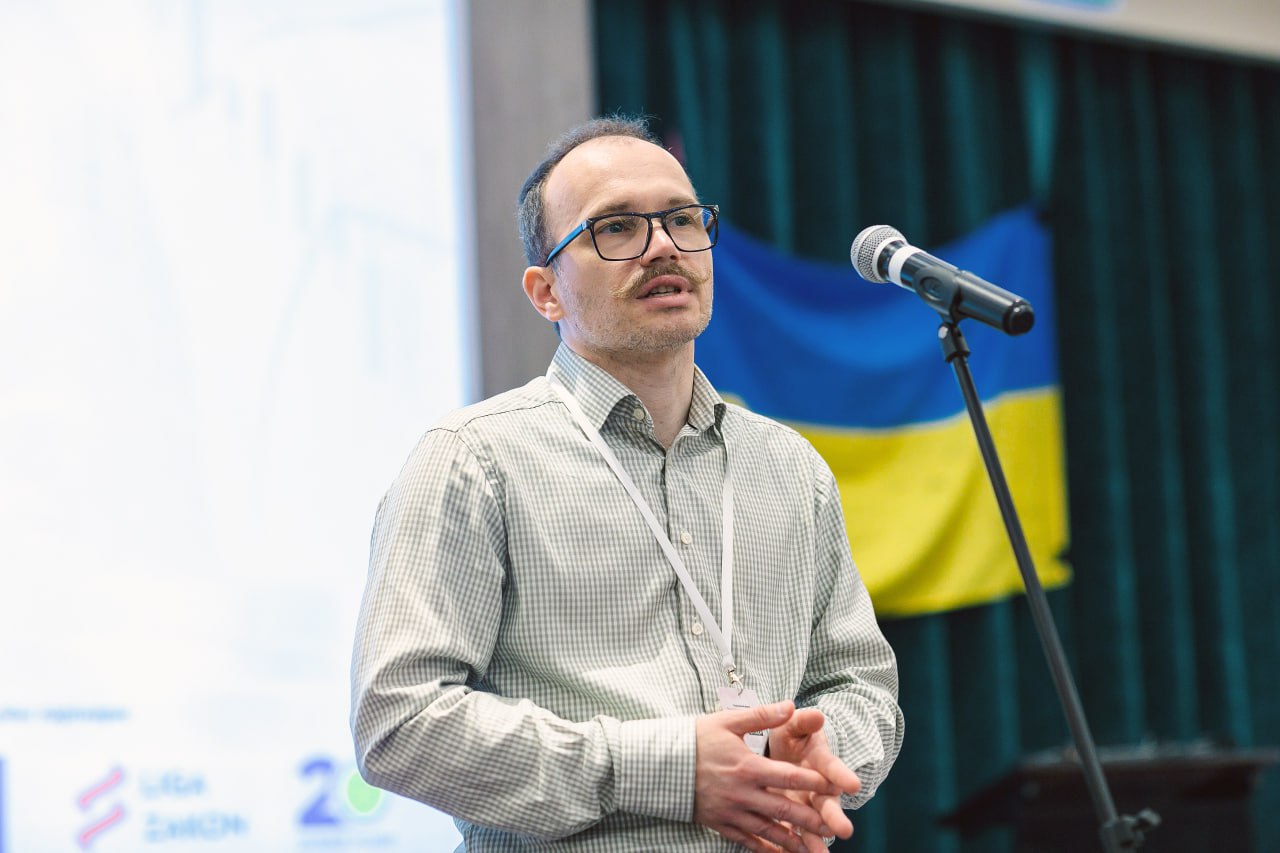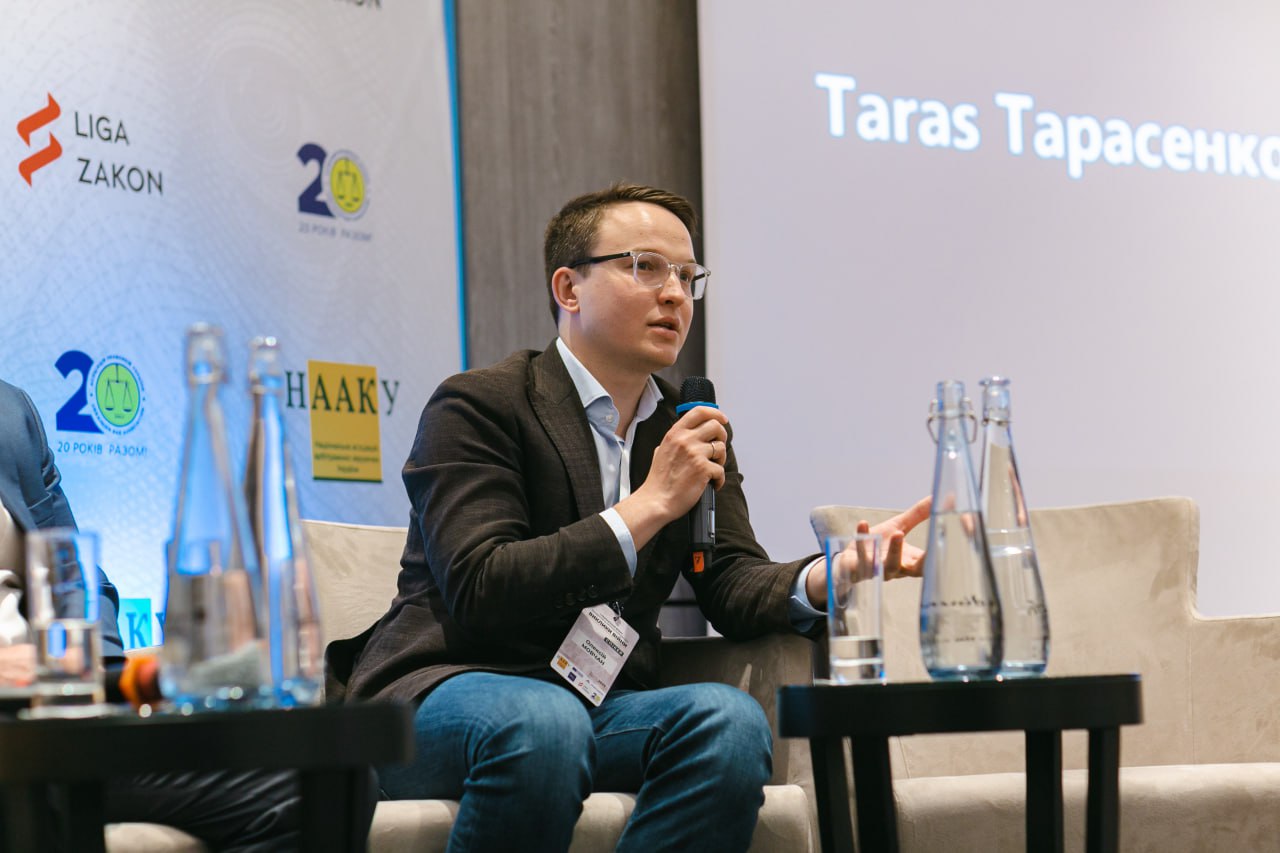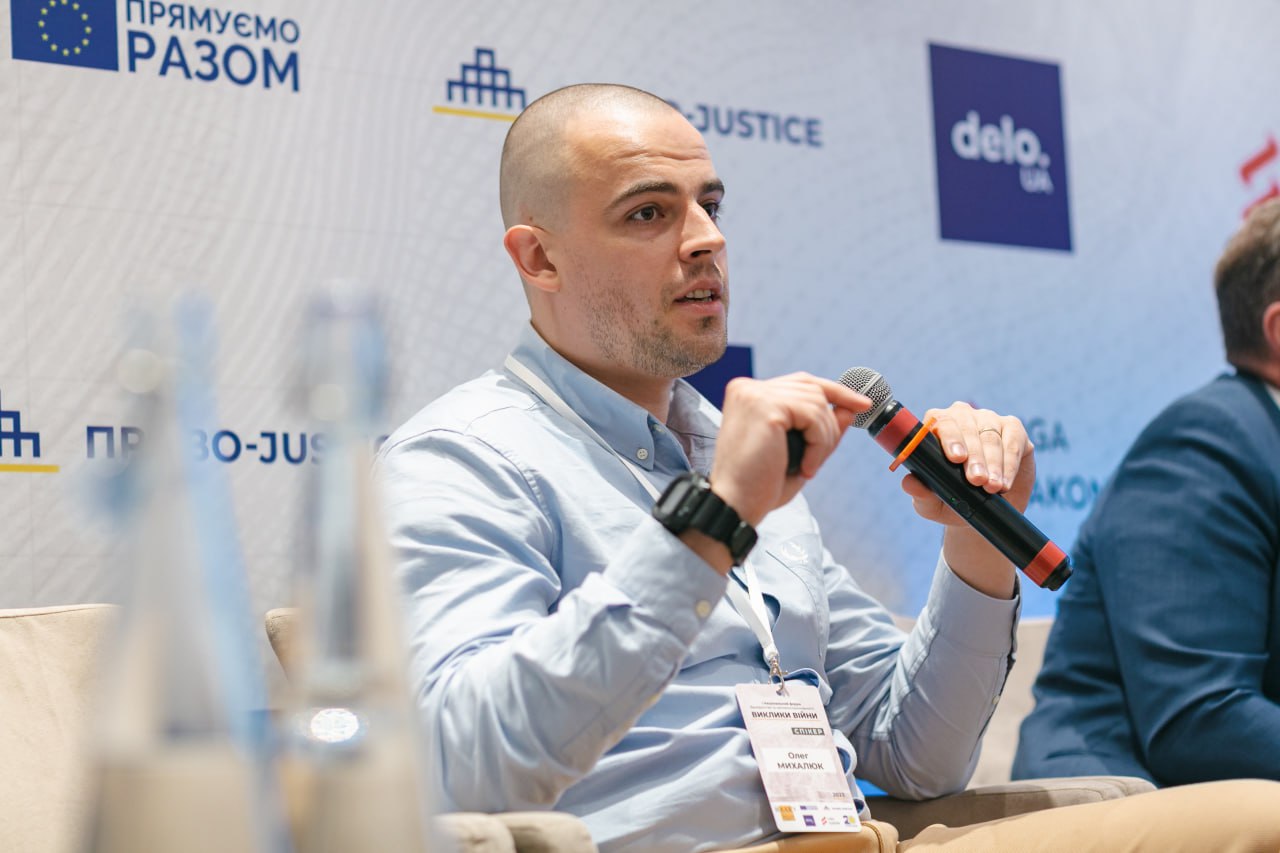EU Project Pravo-Justice Supported the Ukrainian National Insolvency Trustees Association with Holding the 1st National Insolvency Forum

On June 2, the EU Project Pravo-Justice together with the Ukrainian National Insolvency Trustees Association held the 1st National Forum organized by the UNITA and entitled “Insolvency and Bankruptcy in Ukraine. Challenges of Wartime”. The participants to the event were representatives of the Ministry of Justice of Ukraine and the judiciary; MPs; BTs, members of the banking community; lawyers; PEOs; managers of state-owned and private companies.
Mykola Lukashuk, Head of the Dnipropetrovsk Regional Council, first Chairman of UNITA, addressed the participants to the Forum with a welcome speech. He recalled how the Association was created; assessed first achievements of the unified professional community, and outlined the challenges faced by BTs, which are caused by wartime.
“Today, a huge number of the enterprises, which we were thinking to put on Prozzoro and sell, in order to further repay the claims of creditors, have become critical for the state economic and for the economic rebuilt, because other similar enterprises were destroyed. A huge number of enterprises in the agricultural sector, which entered into bankruptcy procedures, fully ensure food security not only in Ukraine, but also in a number of other countries. Therefore, you, BTs, are entrusted with a huge responsibility, which is to preserve the capacity of industrial enterprises for the future rebuilt of our country,” said Mykola Lukashuk.

Denys Maliuska, Minister of Justice of Ukraine, mentioned in his welcome speech the three challenges the State – and the BTs’ community – is currently facing. The first challenge is a full-scale war, despite which the economy shall withstand, while legal procedures shall develop and improve. The Minister said that the State should reduce the number of moratoria, and improve and promote insolvency procedures instead.
“Another challenge is European integration. There is a prospect of EU membership. This means bringing national legislation and its practical application in line with the EU requirements, including the relevant Directive 2019/1023. The time has come for more changes to the existing legislation,” said Denys Maliuska. The third challenge, according to the Minister, is the fight against corruption.
“There should be no corruption in the procedures related to restoration of solvency. I have something to ask you about: let us change the country together”, added Denys Maliuska.
Oleksandr Bondarchuk, Head of UNITA, spoke about how the UNITA had been adapting to the realities of the Great War; about BTs engaging in volunteering and the problems that arose in professional activity due to martial law.
“Over the past year, great efforts have been directed at settling the issue of delay in payment of funds advanced by initiating creditors to the BT. The UNITA Board continues taking part in various bankruptcy-related legislative initiatives that are implemented in many forms. The voice of our community is listened to and taken into account,” said Oleksandr Bondarchuk and shared the UNITA’s plans for the future. They include: participation of the Association members in the process of harmonizing the national legislation on insolvency with EU law; development of legislative amendments in the field of bankruptcy for the war period; contribution to addressing the regulatory issues of the BTs’ activities; completion of work on the creation of the Electronic Cabinet of BTs; and further institutional development of the UNITA.
The 1st National Forum “Insolvency and Bankruptcy in Ukraine. Challenges of Wartime” took place in the format of four sessions.
The first session was devoted to state regulation in the field of insolvency and state support under martial law. During that session, Oleksii Movchan, MP of Ukraine, spoke about the legislative track in the field of insolvency, namely, which legislative initiatives had already been adopted, and which ones were expected to be passed soon.

“I hope that by the end of 2023, we will manage to harmonize the national legislation with the EU Directive 2019/1023. I hope as well that the professional community will be interested in draft law No. 8205,” said Oleksii Movchan. The MP also spoke out in favor of reducing the number of moratoria in the field of bankruptcy.
“This should be done to ensure the mobility of capital in the economy,” added Oleksii Movchan.
Taras Tarasenko, MPy, focused in his speech on the need to empower BTs to form a package of creditor claims, which would be taken into account when forming international registers of compensation for losses by the Russian Federation.
“In this case, the creditors will have a chance to return their money, even though probably in 7 or 8, or 10 years,” said MP Tarasenko. The MP also called on the Ministry of Justice and the Office of the Prosecutor General to hold additional consultations on the inspection of BTs; recognition of results; and legality of opening criminal proceedings against UNITA members.
Vladyslav Filatov, Director of the MoJ Bankruptcy Department, spoke about the tasks the Ministry of Justice of Ukraine faced regarding the development of the insolvency industry.
“We hope that the e-Cabinet of the BT will become operational in the autumn. We are already testing the automated bankruptcy system “Insolvency”. The IT solutions for the BTs’ interaction with Ukrainian registers and databases, and even those of the EU, are being developed”, said Vladyslav Filatov.

Oleh Mykhaliuk, Key National Expert of the EU Project Pravo-Justice, focused in his speech on the novelties of EU Directive 2019/1023 on the principles of preventive restructuring, and outlined the document’s implementation track in various EU jurisdictions.
“The key idea of the Directive is that pre-trial restructuring should not apply to all companies having problems with solvency, but only to viable companies. Once the Directive is implemented in the national legislation, Ukraine can get a tool that will make it possible to keep viable companies on the market, those which are necessary to the State, economy, and society,” said Oleh Mykhaliuk.
Arne Engels, International Expert of the EU Project Pravo-Justice, BT, lawyer (Germany) spoke about the peculiarities of the implementation of EU Directive 2019/1023 in EU countries while also mentioning potential challenges for Ukraine.
“Finding a balance, when regulating bankruptcy procedures, is the first big challenge for Ukraine. The second one is the implementation of Directive 2019/1023 to the national legislation,” said Arne Engels.
Bartosz Sierakowski, Deputy Director of the Institute for Bankruptcy, Restructuring Law and Insolvency Research (Poland) shared Polish best practices in pre-trial restructuring.
“More than 90% of all restructuring procedures that have been opened since December 2021 are out-of-court agreements and procedures. These procedures are popular because they do not involve any court decisions at the initial stage. This means that an insolvent entrepreneur may reach agreements with an insolvency adviser. According to such an agreement, the restructuring may be launched without any decision of the court or other authorities. Such a decision, which is taken by the debtor and the arbitration manager, can be public. Such a decision is published in the Bankruptcy Register. Once it is there, the debtor shall be protected from any enforcement proceedings,” said Bartosz Sierakowski.
The second section covered “Business in Wartime: Preservation, Restoration, Responsibility.” The speakers talked, among others, about what businesses need to do now in order to claim compensation for damages caused by the Russian aggression in the future. Case law on cases related to joint and subsidiary liability was presented. Peculiarities of regulation of insolvency and bankruptcy of defense sector enterprises in wartime were discussed.
Session three was dedicated to “Challenges of War: Functioning of the Banking Sector, Moratoria, Sanctions, and Nationalization, Impact on Bankruptcy.” Bankruptcy-related court procedures in wartime became the key topic for the speakers’ of the fourth session of the Forum.
The charitable fund-raising was held during the Forum for the purchase of the necessary equipment for the divisions in which the BTs are currently serving.
Video record of the 1st National Forum “Insolvency and Bankruptcy in Ukraine. Challenges of Wartime” is available here.